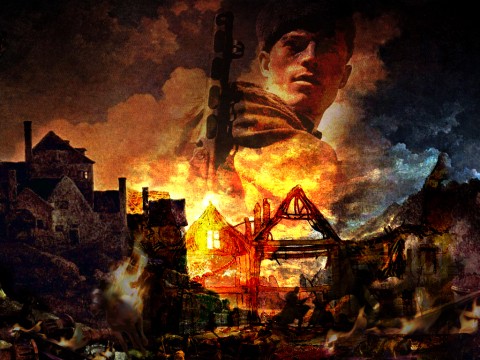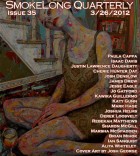From the Baltic Coast, through East Prussia, women and children of sunny blonde hair stagger like a sea of fish through the icy winter, flapping helpless in columns so thick that high-altitude bombers would have no problem targeting them. From the oval window of my homestead attic, I see a young girl in a dark fur coat emerge from the procession, shouting Brauche einen Sarg!—”need a coffin.” One anonymous life, taken by the march, is nothing compared to the vast orgy of violence awaiting those of us who stay behind. The marchers tell stories of bodies crushed by tanks in their fruit market, of women nailed to walls, crucified on the wooden planks of a barn. Let the women pay, say the red army, if they be Deutsch.
And history will say we deserved it. Our day of reckoning. We pulled the pin on our own grenade. We marched to Moscow in the summer so our children could freeze in the winter. When the red army comes here, they will discover my granddaughter’s dollhouse. My daughter’s mantle clock. Our lavishness will spur their anger. The home will be set ablaze, perhaps while I still inhabit this attic bedroom. They will wonder what we could have wanted from their paltry potato farms. Everything in this familiar universe will disappear.
Strangely, in this somber moment, I cannot wait for them to come. He will be among them, my son. It’s been twenty-six years since he was taken from me to Moscow. He is twenty six now, undeniably, somewhere in the red army, marching, leaving behind him a trail of fire and fury. In the gruesome stories of our Armageddon I see our reunion. My little bear, my little treasure. Meine Engel.
The radio’s comforting voice returns. It tells me to be thankful I lived long enough to see the end. I should be happy to be allowed to die for Deutschland. Loyalty is our honor.
The radio goes soft.
The storm arrives in a barrage of artillery fire. In the distance I hear the unfamiliar sound of guns, the screaming aircraft above, the mortars dropping in the far off distance. From my window I see the Poles pillaging. I see a young woman lying in the street with one of the old clerks. Dogs bark. Everything vibrates and crashes to the floor. Things shatter. A great force lifts me up; I am thrashed upon the floor. Leaning on my spinster’s rocking chair, I am able to stand, with ringing in my ears.
So this is the war.
I feel the winter breeze toss in from the crushed oval window, but it is not cold. How strange, that the city could be so warm. The couple making love in the streets now moves to the beat of the machine guns. The fires of the pastry shop provide the light of their horrid romance. Hunks of metal and planks rain upon the empty street. A horse runs by, its back blazing a vengeful blaze.
I lay on my quilts, below the bed, if more debris should come down. I lay with the scurrying spiders and rats, some crushed by falling books. The earth itself seems to shake us off, we Deutsche, as if we were parasitic insects—the very disease we had hoped to eradicate. I place my hands on my knees and realize I am shivering in fear. Will I too be nailed to the walls? Will it be my son who does the deed? Will he know that it was I who suckled him, who gave him my body before he was taken from me?
Another mortar drops. The whistle, the wordless violence. The bed shakes and the roof collapses in places, but the air it brings in is warm, caressing and easy to inhale.
After the bombing I cannot recognize the room. This room where I spent my later life, this veiled attic now caved and opened for the world to see. I hear the enemy’s strange language. How beautiful it is on the ears, with names like Dimitri. Is my son a Dimitri, a Fyodor, a Michail? As soon as the air cools, the red army lights another house, some of the wood burning too slowly to hold the soldier’s attention. As night comes pieces of sliced paper float by, posters that once pronounced the Fuhrer’s call to arms. They float like fairies, their trails of ash their fairy dust, their smell of smoke their mystic fragrance. I can feel his presence in this warmth; I am flushed with memories of his grip on my index finger, his indescribable baby smell that always made me crave Allgäu cheese.
The gunshots are logical now. They come rat-a-tat-tat, one for every person lined up behind the pastry shop. No fearful screams. In Herr Hoch’s house, I hear red army soldiers laughing to the whimpering of a lone female voice. The woman does not scream. No Fraulein could scream loud enough that history could hear her.
I hear more Russian voices, so close now. In the house. Hard, wintered boots clap upon the oak planks. I feel him, drawing open the attic door, peering in, finding me sitting on the bed. I see only his silhouette as he peers into the dark room. With my eyes adjusted to the darkness, I see the stranger, far too young to be my son. But his eyes are filled with fear, not fury. His eyes have never known me or this place. He cannot help but see me.
The soldier says something to the others. They want to search, but he convinces them to leave. I hear them loiter outside my house, making jokes in that rhythmic language of theirs. Then they are gone.
As the red army embarks for Berlin, I am soothed by the sound of their slow-moving tanks. I will stay to pick up the pieces; they have pushed me into it. Indeed, the boy was my Kind. He was my child.



 The SmokeLong Grand Micro Contest (The Mikey) is now an annual competition celebrating and compensating the best micro fiction and nonfiction online.
The SmokeLong Grand Micro Contest (The Mikey) is now an annual competition celebrating and compensating the best micro fiction and nonfiction online.